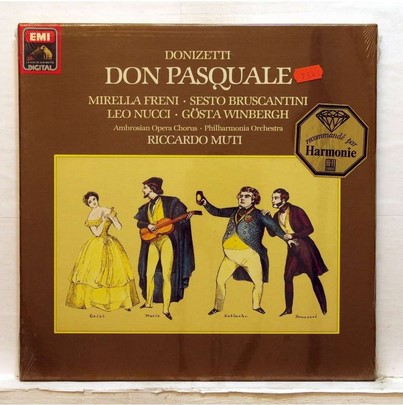
Director: Sarah Caldwell
Interpretes:
- Alfredo Kraus (Ernesto)
- Alan Titus (Malatesta)
- Donald Gramm (Don Pasquale)
- Beverly Sill (Norina)
Comentarios
Aporte de Jose Manuel
Beverly Sills is the main draw here. Her vocal agility is quite dazzling and full of good humor. Alfredo Krauss sings his part brightly and cleanly. Had anyone asked me when this cast was being assembled, Donald Gramm would have been just about last on my list for the role of old Pasquale but he makes a valiant stab at it. Alan Titus provides a workmanlike Malatesta, although his voice lacks the sheer beauty do do full justice to his big aria, “Bella siccome un angelo”. The LSO sounds fine and is nicely captured.
That said, I feel impelled to add that whatever its virtues, this performance is missing much. When I played the ancient Schipa-Saraceni recording for comparison, it became instantly clearly what was most missing. In the dimly captured sound of seventy years ago comes full measure of what is hardly on the 1978 set at all–a sense of fun.
“Don Pasquale” was created as a trifle, a mere moneymaker, while Donizetti (largely fruitlessly) wooed success and prestige at the Paris Opera. It is loosely based on a veteran buffa piece called “Ser Marcantonio”. Donizetti gave the stock comic characters of the older comedy slightly more depth and updated them into bright, new 19th Century forms, setting them to a mix of his old and new tunes in so brief time as to astonish us still. “Don Pasquale”, the opera, was created out of old fluff and fully intended to be new fluff. When Don Pasquale, the comic old geezer, is struck on the cheek by Norina, the soubrette, the cheek should hurt–but that cheek should also be attached to a head solidly packed with feathers.
The Saraceni and Schipa of seventy years ago float like butterflies over the loveliest and livliest of melodies, delighting us with the sheer pleasure of it all. In the newer set Sills is clearly having fun for herself, but rather too cruelly at the expense of Donald Gramm’s sympathetic old Pasquale. Titus’ Dr. Malatesta comes over as more schemer than jokester. The big cross-purposes duet of Don Pasquale and Dr. Malatesta is performed efficiently, but wholly without hilarity. Krauss as Ernesto is . . . earnest throughout.
I think that in the very earliest stages of preparation for this performance a choice was made to emphasize musical values over comedy, hence the heavy overlay of decoration placed upon Sills’ music. The decorations are sung beautifully–none better at this than Sills!–but at the cost of obscuring lovely little melodies that would have been better in their simplicity. Another result was the deadening of Pasquale and Malatesta’s big, show-stopper of a duet into almost hum-drum conversation.
Caldwell’s conducting is a problem area. To my ear, the 1978 recording is a group of set-pieces, one after another, without dramatic propulsion or performing arc. This is in marked contrast to the older version’s definite sense of continuous forward motion. The contrast is all the more marked when one remembers that seventy years ago, technology demanded that the opera be recorded in very short takes.
Finally there is the incredibly dumb decision to perform Com’e gentil, the best-known aria in the opera so far off-mike. What WERE they thinking about?
This is a performance deeply flawed by production and conducting decisions. It is unworthy of the fine talents that the singers might otherwise have brought to it. It is not even slightly comparable in quality with the ancient but wonderful Schipa-Saraceni set or even with the appallingly recorded but marvelously performed Corena-Peters-Valetti set.
